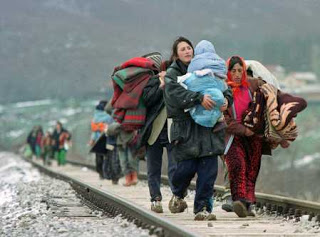SwedishNews
Topless in a Swedish mosque. IKEA founder Kamprad comes home. Every tenth president a woman. Increased resistance towards refugees.
-
 Ingvar Kamprad, Ikea's founder, is moving back home to Sweden after 40 years abroad.
Ingvar Kamprad, Ikea's founder, is moving back home to Sweden after 40 years abroad. -
-
Topless in a Swedish mosque
Three young women from the activist movement Femen, entered a mosque on Sodermalm in Stockholm last Saturday, removed their tops in the entrance area and shouted, in English: “No sharia!” and “Free women!” Employees at the mosque called police, and several patrols arrived. The bare-chested women were carried out to a waiting van. According to commander Jonas Svalan, the women are held by Swedish police on suspicion of disorderly conduct (nudity) and assault (shoving). According to information, the women come from Egypt, Tunisia, and Sweden. Femen is originally a Ukrainian group of women who through “sextremism” draws attention to the lack of gender equality and democracy.
Learn more about Femen: http://femen.org/en -
 Led by the Egyptian activist of FEMEN Alia Al Mahdi, three sextremists of the movement held a topless rally in the main mosque in Stockholm. Egyptian, Tunisian and Swedish sextremists of FEMEN symbolically rid of the black hijabs, in the heart of a place of worship. Image source: http://femen.org/en
Led by the Egyptian activist of FEMEN Alia Al Mahdi, three sextremists of the movement held a topless rally in the main mosque in Stockholm. Egyptian, Tunisian and Swedish sextremists of FEMEN symbolically rid of the black hijabs, in the heart of a place of worship. Image source: http://femen.org/en -
-
IKEA founder Kamprad comes home
After 40 years as an expat Swedish Ikea founder Ingvar Kamprad has made the decision to move back home: In the fall he will move back to his estate in Småland. After the death of his wife, Kamprad wants to be closer to his family and friends. It was in 1973, that he left Sweden; first for Denmark and then, later, to Switzerland where he now lives. But after Margareta Kamprad’s death in the end of 2011, Kamprad has felt increasingly homesick. “I move back to Sweden in order to be closer to my family and my old friends,” he says in a comment to daily Sydsvenskan via his spokesperson Per Heggenes. “Since my dear wife Margareta died (…) less and less keep me in Switzerland.” Kamprad will settle on the estate outside of Älmhult, Heggenes explains. “It’s a natural step in the last phase of life. Sweden is also a place where the family often gets together.” Moving back to Sweden again, means also paying Swedish taxes, an issue that has been much discussed ever since Kamprad first left. Says Heggenes: “Ingvar will pay taxes on his income, just like everyone else in Sweden. But the move has no other tax consequences.” -
 In Sweden, every tenth president of a company is a woman.
In Sweden, every tenth president of a company is a woman. -
Every tenth president a woman
Every tenth company in Sweden has a female president, based on companies with over five million SEK ($740,000) in revenue and with at least five employees. Every fourth company has at least one woman on the board, but in total women have only 15% of the board positions, according to a new study by Almi Företagspartner. The study included 90 000 companies, and the female presidents could be found mainly in the smaller companies. The highest representation of women are companies that deal with health care and education, the lowest were those dealing with industry and manufacturing. -
 Sweden has had a difficult time helping an unprecedented number of refugee immigrants, but now the EU is discussing international cooperation and measures to prevent trafficking and humanitarian policies.
Sweden has had a difficult time helping an unprecedented number of refugee immigrants, but now the EU is discussing international cooperation and measures to prevent trafficking and humanitarian policies. -
Increased resistance towards refugees
According to 2012 year's SOM study, which was just recently presented at Goteborg University, the resistance towards refugee immigrants in Sweden is increasing. 45% of the Swedish population believe it is a good idea to accept fewer refugee immigrants, in 2011 the number was 41%. An increased interest in questions regarding migration and integration during the fall of 2012 may be one possible cause to the increase. Media gave more space to the issue, and there was a greater focus of the politics of the Sweden Democrats, at least that’s what the researchers behind the study think. Over time however, from 1992 to 2012, the resistance to immigration in general has decreased from 65%. The suggestion the people polled was given was: “Accept fewer refugee immigrants in Sweden”. The alternative answers were: “very good”, “quite good”, “neither good nor bad”, “quite bad”, and “very bad”. This question was included in all the nation-wide sub-surveys, of which the national SOM study consists. In total 6 298 people were polled in 2012, which means a response rate of 52%. The questions were mailed out last September and the work of putting the study together was completed in February of this year. The SOM Institute at Göteborg University has researched Swedes’ media habits, their spare time habits, their health, values, and attitudes every fall since 1986. -
Fewer Swedes report hate crimes
The number of hate crimes in Sweden with homo- bi- and hetero phobic motifs has decreased with 32% in five years. During 2012, there were little over 5,500 police reports of crimes with hate motifs, and nearly three quarters of them were racist, according to Brå (Brottsförebyggande rådet or the Swedish National Council for Crime Prevention), whose report was presented this week. Nearly 4 000 hate crimes with racist or xenophobic motifs were reported last year. Of them, the number of Islamophobic, Antisemitic, and Christianity phobic crimes were 6, 5, and 4% respectively. The number of hate crimes that had some connection to the victim’s sexual preference was 750 and made up for a total of 14%. The total number of reports was 5,520, more or less the same as previous years, but the motifs had changed; homophobic reports had decreased the last few years. “That may mean a decrease of homophobic hate crimes in society, since the efforts of police ought to have led to more identified reports, but at the same time the acceptance of homosexuality in society has increased in recent years,” says Brå investigator Carina Djärv. The decrease is offset by increases in the number of reports with phobias to Africans and Romani people, but all in all the number of reports has decreased with 6% since 2008. The Brå report also states that there are local variations, like the number of anti-Semitic reports, which has increased in Malmö. Unlawful threats and harassments are the most common types of crimes, making up for 41% of all reports, followed by violent crimes and defamation, both 16%. The violent crimes have decreased during the last five years, while libel has increased by almost as much. Brå’s annual hate crime statistics is based on its national safety study, NTU. For this year’s report information from Skolundersökningen om brott (the school study on crime) has been used for the first time. -
-
